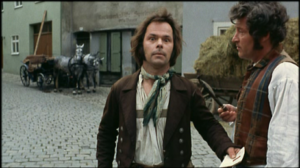 In the 1970s and early 80s, before his present incarnation as a documentary filmmaker, German director Werner Herzog created a body of work in fiction film that established him, in my opinion, as one of the great cinematic visionaries of our time. The first of his movies I ever saw, which affected me profoundly and remains my favorite Herzog film, was The Enigma of Kaspar Hauser, released in 1974. It’s based on a famous true story that has inspired lots of books, plays, poems, television shows, and at least two other films.
In the 1970s and early 80s, before his present incarnation as a documentary filmmaker, German director Werner Herzog created a body of work in fiction film that established him, in my opinion, as one of the great cinematic visionaries of our time. The first of his movies I ever saw, which affected me profoundly and remains my favorite Herzog film, was The Enigma of Kaspar Hauser, released in 1974. It’s based on a famous true story that has inspired lots of books, plays, poems, television shows, and at least two other films.
In 1828, a youth appears in the streets of Nuremberg, carrying a strange note. Outside of a few words that he has learned by rote, the young man cannot speak. Evidence from the note indicates that he’s been kept in a cellar all of his life by an unknown person and that his name is Kaspar Hauser. He has now been released for some reason, and attracts a lot of attention from the townsfolk, but what can people do for this feral human? City officials decide to put him in a local circus freak show, where he languishes until a professor takes an interest, and gradually starts to teach Kaspar how to speak and read German, and eventually succeeds in socializing him to a remarkable degree. Yet there is always something in Kaspar Hauser that seems inaccessible to the civilized word, and resistant to the conventional beliefs and practices of society.
To play Kaspar, Herzog chose Bruno S, a street musician that he had met by chance, who was schizophrenic and a victim of prolonged abuse from his family and various institutions. It was a brilliant and uncanny choice—Bruno embodies the raw and untutored openness of Kaspar Hauser with a vulnerability and intensity that is hard to imagine a professional actor being able to pull off. Three years later, Herzog had him play the lead in Stroszek, another great film.
Although the idea is similar to Francois Truffaut’s The Wild Child from 1970, Herzog by contrast is utterly ambivalent about the civilizing process that his hero is put through. Kaspar is an eager learner of knowledge on natural subjects, and even abstract thinking such as philosophy, but in attempting to learn the conventions of 19th century society, it’s society that comes off looking bad, not him. And this is definitely part of Herzog’s intent—we observe the rigidity of social norms, the prejudices of class, and the complacent hypocrisy of business from Kaspar’s wondering perspective, and the result is amusing but often quite sad as well.
And the film goes much deeper than just social critique. Herzog’s brilliant use of silence and stillness evokes the mystery of the soul in nature before it is corrupted by human desire and duplicity. The movie’s title in English is usually either The Enigma, or The Mystery of Kaspar Hauser, but the literal translation of the German title is: Every Man for Himself and God Against All. This amounts to a blistering attack on the violent contradictions of so-called civilized humanity, in which the human being as such is abandoned to the play of ruthless material forces, and to a seemingly cosmic indifference.
Strange, beautiful and disturbing, The Enigma of Kaspar Hauser is available on DVD.

